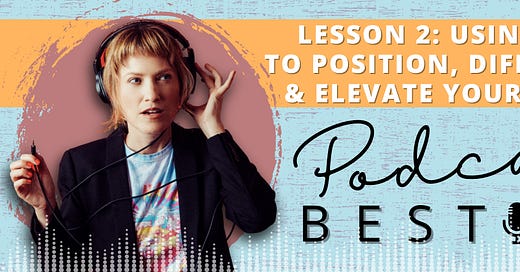Lesson 2: Comps—Understanding the Market
How to use comps to position, differentiate & elevate your podcast
Hey Besties!
Last week, we worked on conceptualizing your podcast.
Today we’re exploring comps and how they can help you make your own podcast better.
What are comps?
In publishing, film, TV, and yes, podcasting, comps (short for comparisons) are used to describe works that are similar to yours. For example, if you’re pitching a show that takes listeners behind the scenes of successful sustainable companies, you might say, “It’s like How I Built This meets How to Save a Planet.” Comps are shorthand for quickly communicating your vibe, target audience, and niche.
For podcasters, comps are invaluable because they help you understand the market, identify where your show fits in, and spot gaps to fill with your unique angle.
Step 1: Analyze competitors (aka potential collaborators)
Pick 3-5 podcasts that are:
In your genre or niche.
Targeting a similar audience.
Shows you admire or aspire to emulate.
Spend some time listening and taking notes on their strengths and weaknesses, what works and what doesn’t:
Content: What topics do they cover? Are they sticking to one niche or branching out? How in-depth do they go into their subject matter? Do they approach topics from a unique or fresh perspective, or do they echo what’s already out there?
Format: Are they interview-based, narrative, chatcast, or something else? How long are their episodes? Do they follow a consistent structure or experiment with different formats? Do they incorporate segments like listener Q&A, expert tips, or storytelling breaks? Pay attention to how these choices keep the show engaging (or not).
Style: What’s the tone of the podcast? Is it casual and chatty, polished and professional, comedic, or poignant and deeply emotional? How does the tone align with the content and target audience? What’s the primary objective of the show—is it to entertain, educate, inspire, or a mix of these? And, importantly, what is the host’s personality?
Audience engagement: How do they interact with their listeners? Do they shout out listeners on episodes, respond to comments on social media, or invite audience participation through polls or voicemails? Are they driving engagement through platforms like newsletters, exclusive content, or live events? Look for creative ways they foster a sense of community and loyalty.
Pro tip: Don’t just stop at shows you love. Analyze a few podcasts you don’t like, too. Sometimes knowing what you don’t want to do is just as powerful.
Step 2: Develop your listening ear
If you’re serious about podcasting, you’ve got to become a student of the medium. This means:
Active listening: Pay attention to the pacing, transitions, and editing choices. Be curious! Ask yourself questions as you listen: “Why do I keep hitting play on this show?” or “What would make this better?”
Trends: Notice what’s hot in your niche (but don’t feel pressured to jump on every bandwagon).
Patterns: Spot recurring themes or notable gaps in coverage.
Step 3: Identify the gaps
Now that you’ve done your homework, it’s time to figure out how your podcast can stand out. Maybe you noticed that:
No one’s talking about your niche from a beginner’s perspective.
There’s a lack of diverse voices in your genre.
Podcasts in your space are way too long and could use a punchy, shorter format.
Think of gaps as opportunities! Lean into your strengths and find a unique spin that sets your podcast apart. Brainstorm at least one way your podcast fills a gap your comps are missing.
Step 4: Put your comps to work
Your comps aren’t just a research tool—they’re also marketing and monetization gold. Use them to:
Pitch guests: “Our podcast is like [Show A], but with a focus on [specific niche].”
Attract listeners: “If you love [Show B], you’ll love us!”
Woo sponsors: “Our show is similar to [Show C], which has a proven track record with [your target audience].”
Identify collaborators: If a show is similar enough in tone or topic to be a comp, there’s a good chance it could also be a great collaboration opportunity.
Now you should have a clearer picture of where your podcast fits in the market and how to make it shine.
Big thanks to our presenting sponsor… YXE Underground, a podcast featuring interviews with people who are doing amazing things in Saskatoon, Saskatchewan, created, hosted, and produced by former CBC journalist Eric Anderson.
YXE Underground focuses on people and organizations in Saskatoon who are making a difference in the community but are flying under the radar. The podcast shines a light on their work and raises awareness of their efforts in Saskatoon.
Kudos to YXE Underground for being in its seventh season telling these community stories. Check it out!
Psst… Do you want to advertise on Podcast Bestie? Here’s info about options and rates.
I’m teaching some upcoming workshops you might be interested in:
How to Build a “Platform” for Writers Who Shudder at the Thought (THIS IS TOMORROW!)
Start a Newsletter to Supercharge Your Platform, Network and Business
So… ROLL CALL! 🗣️
What are one or two comps for your podcast? Can you pitch your show in terms of '“X meets Y”? Share in the comments below for feedback!







If I had to come up with a comp for Lizzie Borden Audio, I guess I would say Perry Mason meets Rocky Horror, as there is a lot of campy humor within the trial testimony. Excellent article, btw!
If I had to come up with a comp for Lizzie Borden Audio, I guess I would say Perry Mason meets Rocky Horror, as there is a lot of campy humor within the trial testimony. Excellent article, btw!